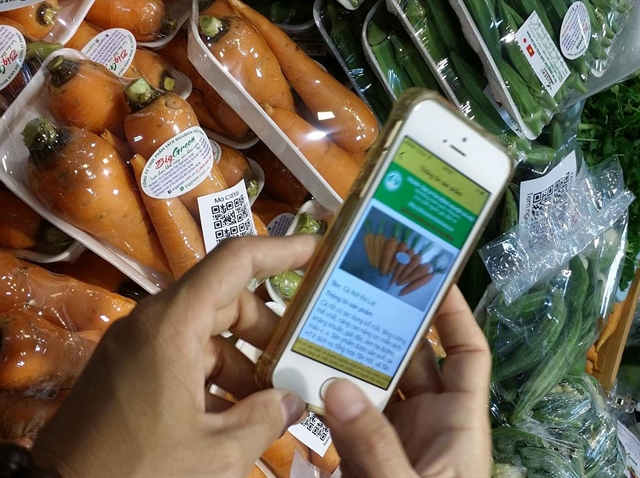Greater effort is needed to boost Viet Nam’s national brand value so as to earn higher export value, heard at a forum on Wednesday within the framework of the National Brand Week Programme.

Greater effort is needed to boost Viet Nam’s national brand value so as to earn higher export value, attendees heard at a forum held in Ha Noi on Wednesday by the Ministry of Industry and Trade within the framework of the National Brand Week Programme.
Experts at the forum said that many products originating in Viet Nam did not make significant contributions to the country’s export value due to the failure in developing brands.
According to Nguyen Van Thao, deputy chairman of the Central Theoretical Council, Viet Nam’s export value was appropriately equivalent to the country’s gross domestic product with dozens of products earning export value of US$20-30 billion per year. However, the country lacked prestige brands, thus, the export value remained modest.
“For many years, Viet Nam has been known as a country of exporting raw materials and doing contract manufacturing,” Thao said, adding that developing Viet Nam’s national brand is a pressing concern.
Nguyen Huu Nghia, deputy director of the Central Economic Committee, said that the core of the national brand was brands of businesses. Still, a large number of firms had not paid adequate attention to building and developing brands.
In addition, the management agencies’ support for businesses in developing brands was not effective enough, plus there was a lack of resources to invest in brand development, Nghia said.
Having an appropriate national brand development strategy was critical to enhance the competitiveness of Viet Nam in the global market, he said but streesed that developing the national brand would require the joint efforts of the whole country.
According to Antonio Tedesco from the Italian Embassy in Ha Noi, Viet Nam could be the national brand with the participation of different resources, not necessarily of only Vietnamese and Vietnamese firms. He added that focus should also be placed on protecting brands.
Many products of Viet Nam were of good quality but promotion to international markets remained weak, he pointed out.
Ngo Minh Hai, chairman of TH Group, said that the core in brand development was product quality coupled with renovations to keep up with the changing trends in the world market.
Vu Ba Phu, director of the Viet Nam Trade Promotion Agency said that the ministry was drafting a Viet Nam national brand programme project for the new period to 2030 with an aim to promote brand development of firms with trade, investment and tourism promotion programmes.
Building national brands is more urgent than ever in the context of rapid international integration, Deputy Minister of Industry and Trade Do Thang Hai stressed at the forum.
Now, more than 80 countries already developed their own national brand development programmes to boost exports.
According to London-based business valuation and strategy consultancy Brand Finance, Viet Nam’s brand was valued at $235 billion in 2018, ranking 43rd in the world, rising two places from the previous year.
The National Brand Week Programme is running till April 21.
“Giving wings to Vietnamese products”
HCM City plans to run a campaign called “Giving wings to Vietnamese products,” to improve the quality of farm produce and food products so that they can enter modern distribution channels and be exported, according to its Department of Industry and Trade.
Speaking at a seminar in HCM City on Wednesday, Nguyen Ngoc Hoa, the department’s deputy director, said after 10 years of implementing, the “Vietnamese people give priority to using Vietnamese goods" campaign has achieved success.
But the campaign targets people’s patriotism and only processed items have achieved a foothold whereas fresh food and other agricultural products have not really won consumers’ trust and their quality is inconsistent, he said.
“The city has huge demand for fresh food.”
It needs 600,000 tonnes of rice, 216,000 tonnes of pork, 130,000 tonnes of poultry meat, one billion poultry eggs, nearly one million tonnes of fruits and vegetables, and 132,000 tonnes of fisheries products annually.
According to market research firm Kantar Worldpanel Viet Nam, with higher incomes consumers tend to spend more on new kinds of goods, but fresh foods and fast moving consumer goods remain their main items of purchase, and they account for more than one fourth of the total spending in the city.
“Consumers are paying greater attention to high-quality products while to be exported products must meet strict quality standards set by importing countries,” Hoa said.
Therefore, the department had proposed a new method to improve the efficiency of the “Vietnamese people give priority to using Vietnamese goods" campaign through the “Giving wings to Vietnamese products” programme, he said.
The programme would help standardise and improve the quality of farm produce and fresh foods through the application of VietGap, GlobalGap, HACCP and other standards in production, and revamp their packaging and enable tracing of product origins, he said.
Distribution channels would sign purchase contracts with producers and only accept products meeting quality standards and traceability, Hoa said.
At the event, the Department of Industry and Trade signed memorandums of understanding with 10 distributors, including Saigon Co.op, E-Mart Vietnam, Satra, MM Mega Market, VinCommerce, Aeon, and Big C, for implementing the programme. — VNS





